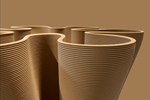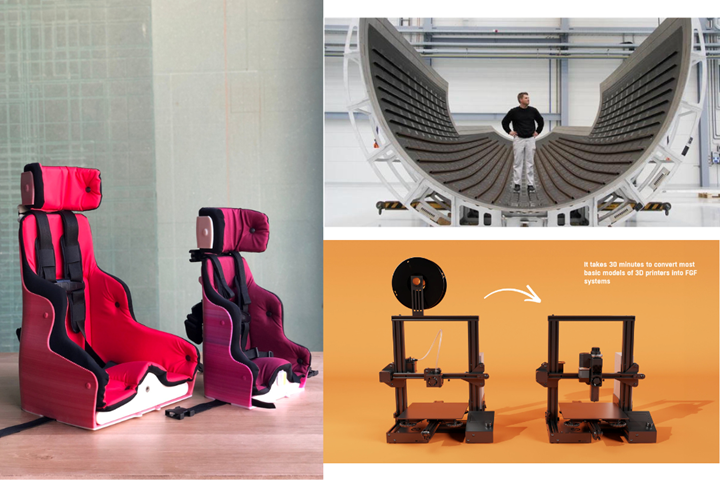Mitsubishi Chemical Group reveals 3D Printing FGF Challenge winner
Startup company selected, including two special recognition awards, highlight FGF applications for children’s seats, FGF extrusion and LFAM for cores and mandrels for composite parts manufacture.
FGF Challenge winners and honorable mentions. The Testa seat enables individuals with disabilities to interact with their surroundings (left); Helix concept represents the retrofitting of a pellet extruder on desktop 3D printers (bottom right); and Center Street demonstrates a large-scale composite part manufactured with water soluble molds (top right). Source | Testa Seat (left), Helix (botom right) and Center Street Technologies USA (top right)
In October 2023, Mitsubishi Chemical Group’s (MCG, Düsseldorf, Germany) Growth Garage, the company’s Open Innovation Hub, in collaboration with partners, launched the 3D Printing Fused Granulate Fabrication (FGF) Engineering Challenge. This Open Innovation program aimed to invigorate co-innovation between top industry players from the 3D printing industry and forward-thinking companies.
MCG’s Growth Garage collaborated with selected industry partners including Alstom, Mitsubishi Heavy Industries, CEAD, Adaxis, Fis Robotics and Nedcam. To promote sustainable innovation, the Global KAITEKI Center and Arizona State University also supported the engineering challenge.
Based on the judging criteria, the jury team panel has selected the overall challenge winner, which will receive $25,000 worth of support in expertise in finding the right 3D printing material, design and manufacturing process to grow the company’s business.
This year’s challenge winner is Testa Seat USA (Pittsburgh, Pa., U.S.). The startup, headed by Alexander Geht, has developed an innovative seating solution, the Testa Seat, to enhance independence, mobility and overall quality of life for children with disabilities, ensuring equal opportunities for active participation in daily activities. The solution employs 3D printing for a customizable, lightweight, cost-effective, full-body support device that matches the needs of the user.
Mitsubishi Chemical Group’s challenge received several strong submissions. Along with the winning entry, two other submissions stood out:
Helix, an early stage startup from Poland, founded by Filip Turzynski, is developing a small, affordable, robust and universal FGF extrusion system that can be installed on most desktop and professional 3D printers. It enables users to use the full range of different 3D printing materials. This technology is said to revolutionizes pellet-3D printing by enabling the printing of small parts with the wide material selection of FGF.
Center Street Technologies USA (Youngstown, Ohio, U.S.) is another recognized startup. Bala Cherukuri and the team have developed an innovation that employs large-format additive manufacturing with water-soluble polymers in pellet form. Their focus is on production of cores and mandrels for composite part manufacturing, typically in large-scale manufacturing of airframes.
MCG offers a wide range of 3D printing FGF materials, spanning from soft to high-performance properties for various applications. Grades with a low carbon footprint, featuring bio-based components or recycled content, are available in the portfolio to enable circular business models.
Related Content
-
Diehl Aviation, 9T Labs present Eco Bracket
Ultra-lightweight and made of recycled composites, the Eco Bracket cuts weight and cost in half and reduces CO2 emissions, in addition to providing high performance.
-
Scaled Composites Model 437 aircraft to be flown for Beacon autonomy testbed
Northrop Grumman subsidiary part of Digital Pathfinder development of stealth aircraft with wings using continuous carbon fiber additive manufacturing and determinate assembly.
-
Industrializing additive manufacturing in the defense/aerospace sector
GA-ASI demonstrates a path forward for the use of additive technologies for composite tooling, flight-qualified parts.

















